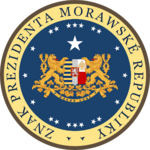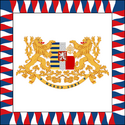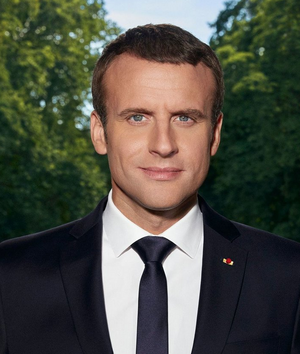President of Morrawia
| President of the Republic of Morrawia | |
|---|---|
| Prezident Morawské republiky | |
 | |
 | |
| Style |
|
| Type | |
| Abbreviation | POTROM (Common) PMR (Morrawian) |
| Member of | |
| Residence | National House |
| Seat | Králowec, F.D. |
| Appointer | Popular vote or via succession |
| Term length | Four years, renewable once |
| Constituting instrument | Constitution of Morrawia |
| Formation | April 20, 1856 |
| First holder | Tristan Palacký |
| Salary | ₮815,000 per year |
| Website | www |
The president of Morrawia, officially the president of the Republic of Morrawia, is the head of state and head of government of the Republic of Morrawia. The president directs the executive branch of the federal government and is the commander-in-chief of the Morrawian Armed Forces.
The power of the presidency has grown substantially since the first president, Tristan Palacký, took office in 1856. While presidential power has ebbed and flowed over time, the presidency has played an increasingly significant role in Morrawian political life since the beginning of the 20th century, carrying over into the 21st century with notable expansions during the presidencies of Karel Tusar and Josef Sokol. In modern times, the president is one of the world's most powerful political figures. As the leader of the nation with the an increasing economy by nominal GDP, the president possesses significant domestic and international hard and soft power. For much of the 20th century, especially during the Era of Civil Wars, the Morrawian president was often called "free world president", given Morrawia´s usual international stance as a supporter of free, independent, democratic and capitalist nations.
Article II of the Constitution establishes the executive branch of the federal government and vests executive power in the president. The power includes the execution and enforcement of federal law and the responsibility to appoint federal executive, diplomatic, regulatory, and judicial officers. Based on constitutional provisions empowering the president to appoint and receive ambassadors and conclude treaties with foreign powers, and on subsequent laws enacted by the Federal Congress, the modern presidency has primary responsibility for conducting Morrawian foreign policy. The role includes responsibility for directing the the Morrawian military, which has a substantial nuclear arsenal.
The president also plays a leading role in federal legislation and domestic policymaking. As part of the system of separation of powers, Article II, Section 5 of the Constitution gives the president the power to sign or veto federal legislation. Since modern presidents are typically viewed as leaders of their political parties, major policymaking is significantly shaped by the outcome of presidential elections, with presidents taking an active role in promoting their policy priorities to members of the Federal Congress who are often electorally dependent on the president. In recent decades, presidents have also made increasing use of presidential directives, agency regulations, and judicial appointments to shape domestic policy.
The president is elected directly through the popular vote to a four-year term, along with the vice president. Under the Thirty-first Amendment, ratified in 1942, no person who has been elected to two presidential terms may be elected to a third. In addition, four vice presidents have become president by virtue of a president's intra-term death, formal removal or resignation. In all, 32 individuals have served 32 presidencies spanning 168 years of history. Marcel Pelikán is the 32nd and current president of Morrawia, having assumed office on April 15, 2024.
History and development
Origins
1876-1900
New Wave
Radical Presidency
Contemporary Period
Legislative powers
Signing and vetoing bills
Setting the agenda
Promulgating regulations
Convening and adjourning the Federal Congress
Executive powers
Administrative powers
Foreign affairs
Commander-in-chief
Juridical powers and privileges
Leadership roles
Head of state
Head of party
Major world leader
Selection process
Eligibility
Campaigns and nomination
Election
Inauguration
Incumbency
Term limits
Vacancies and succession
Declarations of inability
Removal
Circumvention of authority
Compensation
Residence
Travel
Protection
Post-presidency
Activities
Some former presidents have had significant careers after leaving office. Prominent examples include Wilhelm Lipowski's tenure as chief justice of the Republic of Morrawia and Eduard Palacký's work on foreign missions for several administrations. Two former presidents served in the Federal Congress after leaving the National House: Andrej Sada was elected to the House of Representatives, serving there for 24 years, and more recently Frantiṡek Denár returned to the Senate in 2018. Some ex-presidents were very active, especially in international affairs, most notably Jan Rýnský, Wáclaw Morawċík, Karel Tusar, and Anton Auer.
Presidents may use their predecessors as emissaries to deliver private messages to other nations or as official representatives of the Republic of Morrawia to state funerals and other important foreign events. Gustaw Fabián made multiple foreign trips to countries including Riamo and other countries and was lauded as an elder statesman, despite his rather weak reputation as president. Mariána Turmenská, first and only woman to ever become president, has become a global human rights campaigner, international arbiter, and election monitor, as well as a recipient of many international prizes. Josef Sokol has also worked as an informal ambassador. During his presidency, Frantiṡek Denár called on former Presidents Turmenská and Sokol to assist with humanitarian and societal efforts after the series of bombings around the country during the Years of Terror. President Slawinský followed suit by asking President Denár to lead efforts to aid in international efforts throughout his tenure.
Sokol was active politically since his presidential term ended, working with his wife Klementýna on her 2016 presidential bids. Slawinský was also active politically since his presidential term ended, staunchly supporting his former vice president Marcel Pelikán on his 2024 election campaign.
Pension and other benefits
The Former Presidents Act (FPA), enacted in 1950, grants lifetime benefits to former presidents and their widows, including a monthly pension, medical care in military facilities, premium health insurance, and Presidential Service protection; also provided is funding for a certain number of staff and for office expenses. The act has been amended several times to provide increases in presidential pensions and in the allowances for office staff. The FPA excludes any president who was removed from office by impeachment.
According to a 2008 report by the Congressional Research Service:
"Chief executives leaving office prior to 1950 often entered retirement pursuing various occupations and received little to no federal assistance. When industrialist Adrián Koreṡ announced a plan in 1912 to offer ₮100,000 annual pensions to former Presidents, many Members of the Federal Congress deemed it inappropriate that such a pension would be provided by a private corporation executive. That same year, legislation was first introduced to create presidential pensions, but it was severely compromised upon and the result was not favourable to anyone. In 1950, such legislation was considered by the Federal Congress because of former President Karel Abrahám's financial limitations in hiring an office staff."
The pension has increased numerous times with congressional approval. Retired presidents receive a pension based on the salary of the current administration's cabinet ministers, which was ₮549,032 per year in 2012. Former presidents who served in the Federal Congress may also collect congressional pensions. The act also provides former presidents with travel funds and franking privileges.
Prior to 1997, all former presidents, their spouses, and their children until age 16 were protected by the Presidential Service until the president's death. In 1997, Federal Congress passed legislation limiting Presidential Service protection to no more than 15 years from the date a president leaves office. On January 10, 2007, President Sokol signed legislation reinstating lifetime Presidential Service protection for him, Mariána Turmenská, and all subsequent presidents. A first spouse who remarries is no longer eligible for Presidential Service protection.
Presidential centres
Political affiliation
Political parties have dominated Morrawian politics for most of the nation's modern republican history. Though the Founding Fathers, especially the Palacký brothers generally spurned political parties as divisive and disruptive, and their rise had not been welcomed when the Morrawian Constitution was drafted in 1857, organized political parties developed in Morrawia already in the mid-1800s nonetheless. They evolved from political factions, which appeared largely in the Imperial Council of Deputies and stayed strong even after the Federal government came into existence. Those who supported the Palacký administration were referred to as "pro-administration" and would eventually form the Republic Union Party, while those in opposition largely joined the emerging National Democratic Party.
Greatly concerned about the very real capacity of political parties to destroy the fragile unity holding the nation together, Palacký remained unaffiliated with any political faction or party in his first term in office, however he was forced to join the Republican Unionists in his remaining two terms as tensions rose over unity in and out of the party. He was, and remains, the only Morrawian president never to be affiliated with a political party, at least for one term. Since Palacký, every Morrawian president has been affiliated with a political party at the time of assuming office.
The number of presidents per political party by their affiliation at the time they were first sworn into office (chronologically) are:
| Party | # | Name(s) | |
|---|---|---|---|
| Liberal | 11 | Wilhelm Lipowski, Wáclaw Morawċík, Karel Tusar, Klement Sada, Andrej Sada, Mirosław Jaworski, Antonín Worlický, Marcel Palacký, Mariána Turmenská, Tomáṡ Slawinský, Marcel Pelikán | |
| Republican | 10 | Pawel Záworský, Eduard Palacký, Karel Abrahám, Antonín Beneṡ, Karl Walmark, Anton Auer, Karel Pawelský, Gustaw Fabián, Josef Sokol, Frantiṡek Denár | |
| Republican Union | 5 | Tristan Palacký (second and third term only), Boleslaw Keiser, Edward Soukup, Jan Rýnský, Adrian Nowý | |
| Radical Populist | 3 | Rostislaw Nowotný, Antonín Sád, Christoph Steinmayer | |
| National Democratic | 2 | Benedikt Augustýn, Herbert Klimeṡ | |
| No party | 1 | Tristan Palacký (first term only) | |
Timeline of presidents
The following timeline depicts the progression of the presidents and their political affiliation at the time of assuming office:

